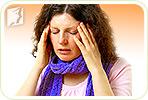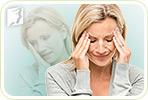
Menopause is usually experienced by women between the ages of 40-50 when her ovaries decrease hormone production and stop releasing eggs. The most typical symptoms of menopause are hot flashes and night sweats. Anxiety is strongly correlated with hot flashes in women.
However, women going through menopause may experience anxiety and different anxiety disorders for many different reasons that are not connected to menopause. It is also important to remember that everybody feels anxious at points throughout their life, and this is different from experiencing anxiety attacks or an anxiety disorder.
What Are Anxiety Attacks?
Anxiety attacks, also known as panic attacks, are sudden and overwhelming feelings of anxiety. Anxiety attacks can be triggered by an event or be a result of anxiety that has built up.
However, it is hard to predict who will suffer anxiety attacks and who will not. Anxiety disorders can be caused by:
- Chemical imbalances in the brain
- Over-activity in the parts of the brain that involve emotions and behavior
- Genetics
- Stressful or traumatic life experiences such as abuse, bullying, or violence
- Dealing with a debilitating health condition
- Drug and alcohol abuse
Menopause: Anxiety and Hot Flashes
Anxiety attacks that happen to women during menopause are similar to the anxiety attacks that happen to people of other genders and ages. However, menopausal women with anxiety problems tend to have hot flashes at a higher rate. Women, and older women in general, are more likely to suffer from anxiety, but why this is, is not clear.
The reason menopausal women with anxiety tend to have more hot flashes is not clear. Increases in hot flashes is not just connected to menopausal women with anxiety, but to women with a range of mental health issues including phobias and depression.
What Does an Anxiety Attack during Menopause Involve?
Along with intense anxiety, symptoms of anxiety attacks include:
- Shaking
- Feeling confused or disoriented
- Rapid heartbeats
- Dry mouth
- Sweating
- Dizziness
- Chest pain
What Can Be Done about Anxiety Attacks during Menopause?

Although there can be a lot of stigma surrounding mental illnesses like anxiety disorders, it is important to remember that many people experience panic attacks and anxiety and there are treatments available to help them.
How to treat an anxiety attack during menopause:
- Seek therapy, counseling, or talk to someone you can trust
- See a doctor, who can prescribe you medicine to treat panic attacks, including antidepressants or sedatives
- Decrease or cut out smoking, alcohol, and caffeine
- Stay or become physically active
- Eat healthy and get enough sleep
- Manage stress: if there is an activity or exercise that helps you manage stress use it (e,g.,yoga,tai chi), otherwise try to search for something that can help manage stress in your life.
- Join a support and follow through on a treatment plan that you choose
A doctor will be able to properly diagnose if you have been having anxiety attacks, and will also be able to prescribe the right medications or lifestyle changes that are right for you.
Sources
- Anxiety and Depression Association of America. (2015). Symptoms. Retrieved from http://www.adaa.org/understanding-anxiety/panic-disorder-agoraphobia/symptoms
- Freeman, E.W.; Sammel, M. D.; Lin, H.; Gracia, C. R.; Kapoor, S.; & Ferdousi, T. (2005). The role of anxiety and hormonal changes in menopausal hot flashes [Abstract]. The Journal of North American Menopause Society, 12(3), 258-266.



